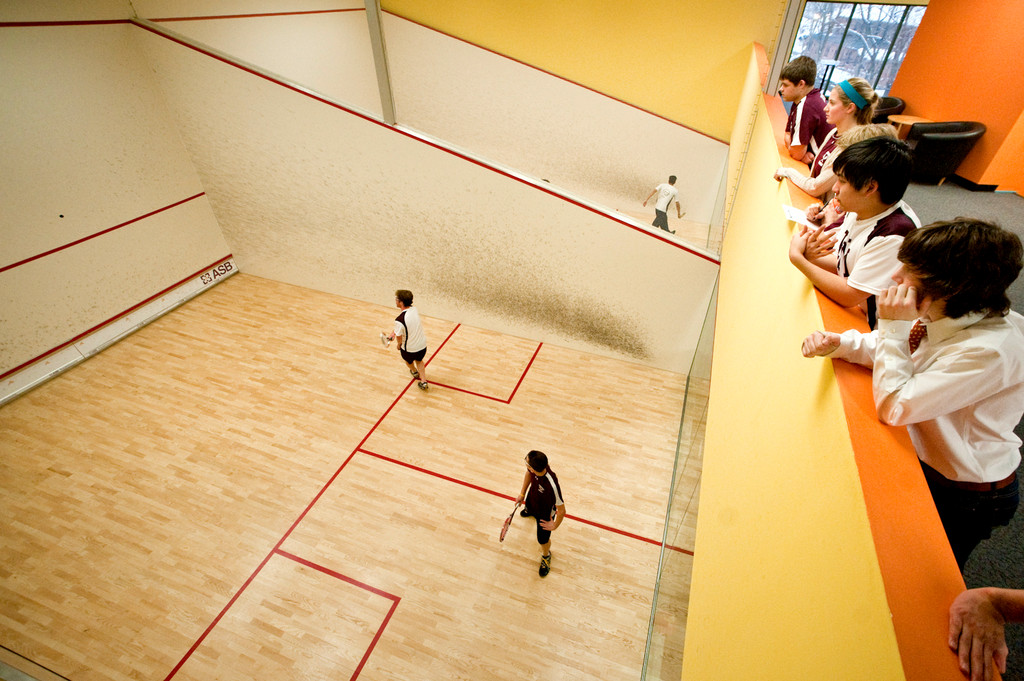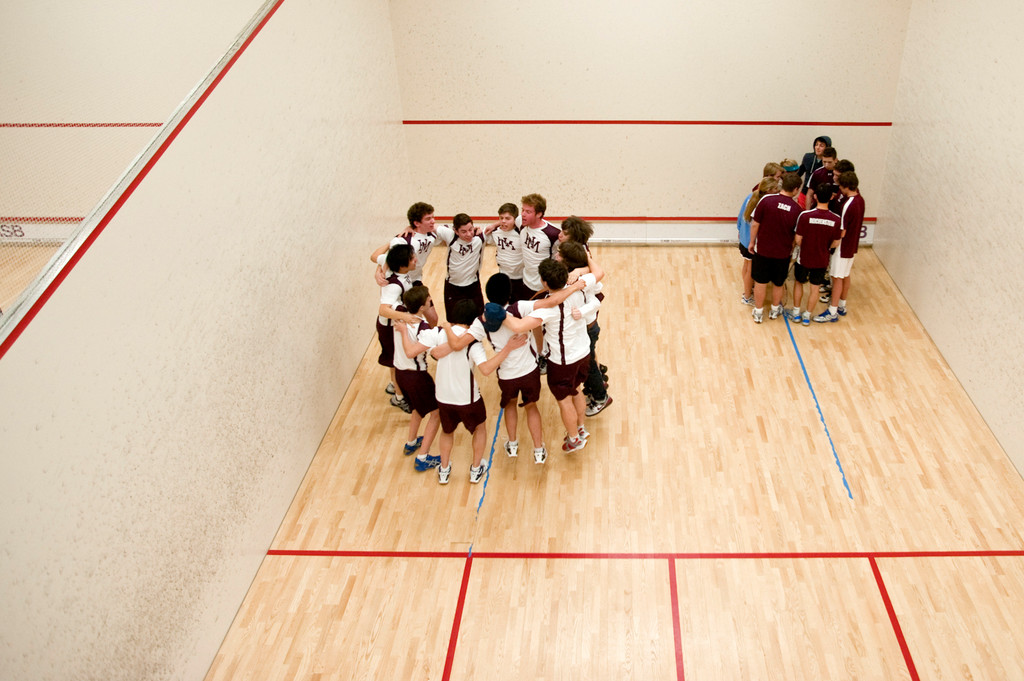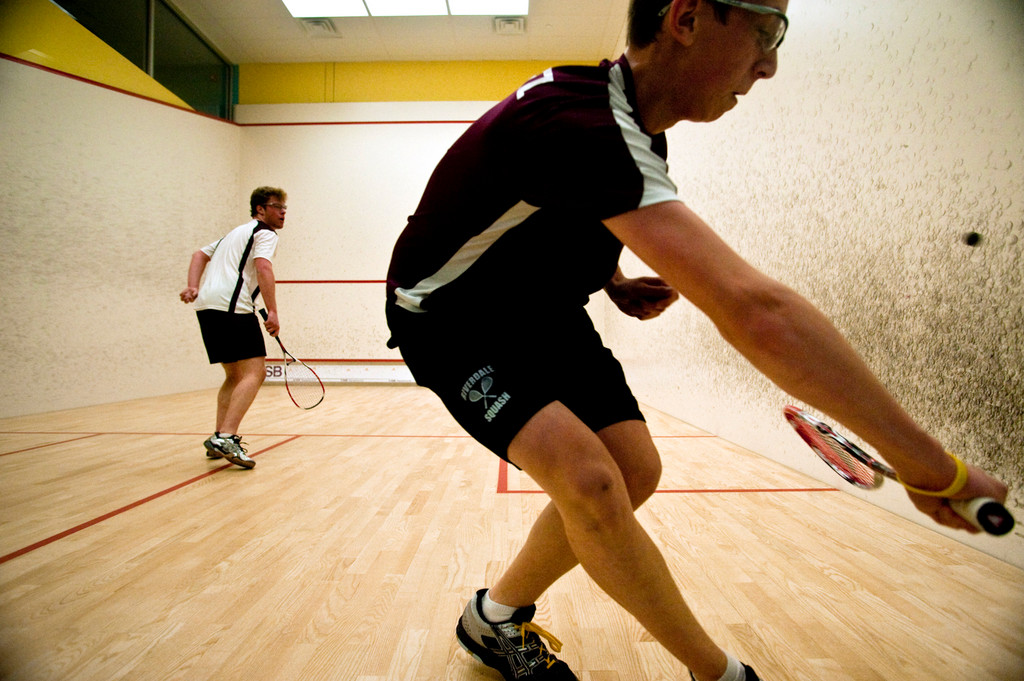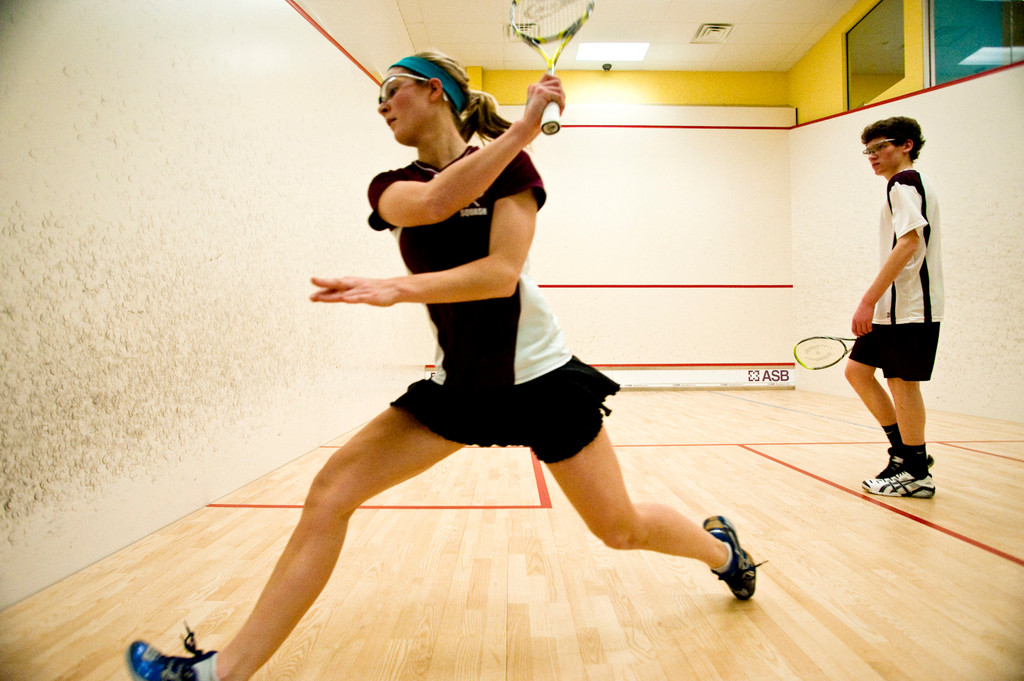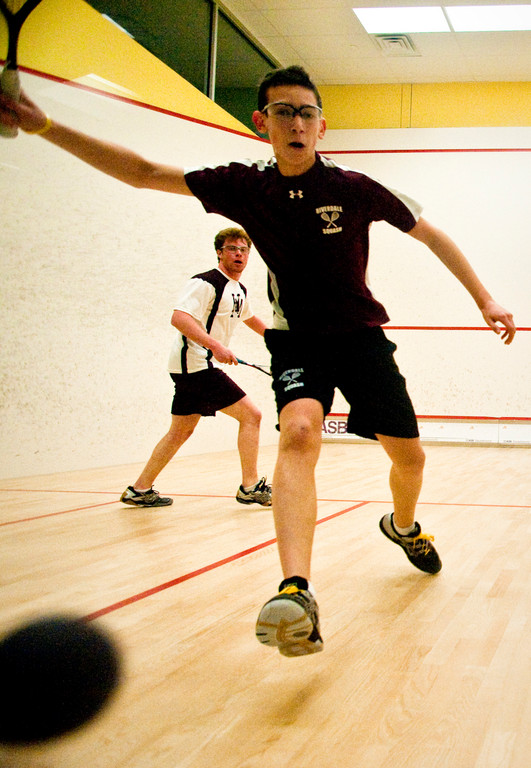Squash is not only the coolest sport, is also happens to be great exercise
To the outsider, squash is the most esoteric of all racquet sports. Bizarre, even silly to some, it mixes long-necked racquets with tight-cornered, claustrophobic courts. The bottom 19-inch strip of each court’s front wall is made of tin, to give players audible proof (like a hammer hitting a cookie sheet) that their swipe at the small, rubber ball has landed too low and out of bounds.
When cold, this about ping-pong-sized ball is virtually dead to the bounce, but once energized by play, it invites some of racquet sports’ fiercest and most oblique exchanges, combined with some of the most delicate.
For the members of the Riverdale Country School and Horace Mann varsity squash teams, and thousands of other squash disciples around the world, these eccentricities do not illustrate the game’s shortcomings, but rather its genius.
“To win a match in squash, you have to be completely present in both mind and body,” said Peter Janulis, a Riverdale senior, who played USTA (United States Tennis Association) tennis as a boy. “There are not a lot of people who dabble in squash. It’s a lot like chess in many ways.”
Squash’s mind-body connection, as well as its likeness to chess, was highlighted by several players on both teams.
Old game, eternal rivalry
As is invariably the case when Horace Mann and Riverdale meet in any competitive setting, the Jan. 28 match at the Pyramid Squash Club in Tuckahoe, was a battle — however civilized.
Down 3-1 in the best of seven contest, Riverdale won three straight matches to edge its hilltop rival 4-3. It was a tough loss for the Lions, who fell to 5-3.
Riverdale was paced by its three top-ranked players, who each won their matches. Jordan Brail, the team’s top-ranked player won his match 3-1; number two-ranked Peter Janulis won by the same score, as did number three Jason Brandner. Riverdale’s other win came from seventh-ranked Stefan Reichenstein, 3-1.
Fourth-ranked Zoe Michas lost 3-1; Luca Pinelli, the fifth-ranked player was shutout 3-0; while number six Aaron Horwitz lost a close 3-2 match.
Numbers nine and ten, Kelly Suchman and Owen Zack, also competed.
The winning players for Horace Mann were fourth-ranked Stephen Cacouris, number five Tyler Finkelstein and number six Josh Goodstein.
Despite losing their matches, top-ranked Pierson Broadwater, number two Harry Finkelstein, number three Evan Hahn and number seven Gregory Swong also competed, as did numbers nine and ten, Jesse Novak and Steven Henick.
Though both teams have more than seven players who practice with the team and often play fellow alternates from opposing schools during matches, it is only the scores of the top seven that are counted.
Riverdale is coached by Sally Hatfield, Horace Mann by Jon Eshoo.
A different racket
Despite their competitive spirit on the court, players from the two school teams were very much in agreement about the merits and uniqueness of squash as a game and the opportunity it affords for a unique physical and mental workout.
And though many of them have played a considerable amount of tennis, all of the players interviewed said they didn’t mind trading the fresh air and opens spaces of tennis for what they see as a more challenging and fun game on the squash court.
“Tennis is too slow,” said Swong, a Horace Mann sophomore. “This is much more fast paced. It is like tennis in a box.”
Swong’s teammate, senior Stephen Henick, said that squash also felt like “indoor tennis” to him when he first tried it as a freshman.
“But I soon came to realize that with squash there is a lot more involved,” said Henick. “In tennis, no matter how good your opponent is, you pretty much know that the ball is coming straight back at you. With squash, the ball can come at you from a different direction every time your opponent hits it.”
Riverdale’s Michas knows exactly what her hilltop opponent means.
“When someone puts that racquet up to go after my shot, I know there are at least a half-dozen things that can be done on the return, and I have to be prepared for all of them every time,” she said. “It’s a great workout.”
Like racquetball, squash is a “multi-walled” game, so players commonly use the side and back walls to return shots and bamboozle opponents.
Since having control of the center of the court, called the “T” (after the makeshift letter T formed from the two adjoining serving squares) gives a player the ability to use either killer hard shots or inaccessible drop shots to win points, both players avoid relinquishing this spot. So, much of the game is played up and down the two outside “rails” of the court: in the middle, where many of the hardest shots are launched; near the wall, where wily drop shots are commonly exchanged; and the back wall, where skilled players make returns that boggle the imagination.
Though it shares much with racquetball, squash has many important differences with its cousin’s bouncy ball and open court. By limiting the liveliness of its ball and imposing out-of-bounds spots on its ceiling, lower front wall, and elsewhere, squash focuses attention away from its accoutrement and towards the skill of its players.
“With each shot, you have to deal with its height, its angle, pace, tightness to the wall, its loft,” said Riverdale’s Janulis. “The more you master hitting all kinds of different shots, the more you feel that nobody can beat you. When you hit a ball two inches above the tin, there is no feeling like it. It’s visceral.”
Janulis’ primitive feelings about his chosen sport have merit, as there is something extremely satisfying about simply watching squash played by skilled players, even on a high school level.
It is not uncommon for most points during an 11-point game to last for 20 seconds or more. Each point is a symphony of textbook overheads and backhand shovels, of forehands with a force Federer would envy, to wee, lethal drop shots. Most breathtakingly, of desperate flails from the court’s back right corner, or the left, that turn out to be carefully planned, three-wall put away shots.
Whereas the stated goal of handball and all racquet sports is to hit the ball where your opponent isn’t, in squash, players seem to be engaging the little ball as much as they are each other. It’s almost as if, despite their desperate fatigue, they want to prolong this wonderful homage to geometry.
“If you hit a winner in tennis, its over,” said Henick. “But in squash, the person you are playing is going to do anything he can to get to that ball. He’ll never give up. And just when you think it’s over he will find a way.”
Or she, as in the case with Riverdale’s Zoe Michas, who is largely responsible for establishing the squash program at her school.
“I have been begging my headmaster since ninth grade to have a team here,” said Zoe, whose father, brother and mother all play the game.
Her closest teammates are grateful Michas has a squash player’s tenacity. “If it wasn’t for Zoe, I wouldn’t be playing,” said Janulis. “She just didn’t give up.”

